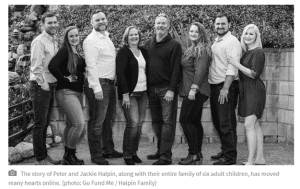Dwelling and Watchwords: Choosing a Verse to Guide Your Path
Before we look at the disciplines of
Dwelling in the Word and
Watchwords, let me tell you a peculiar story.
In 1989, a man from Philadelphia was browsing a local flea market when he came across a vintage painting of a dark and gloomy country scene in a unique frame. Intrigued, he decided to purchase it for $4. However, after bringing it home and inspecting it more closely, he found himself less impressed. As he prepared to discard both the painting and the frame, he noticed a folded piece of paper, about the size of a business envelope, tucked behind the painting within the frame. Curious, he unfolded the paper and assumed it was an early 19th-century reproduction of the Declaration of Independence. Believing it to hold little value, he kept it more out of curiosity than any expectation of significance.
Later, he would discover that the folded paper behind the painting was what one expert described as an “unspeakably fresh copy” of the Declaration of Independence. It was one of the only copies of the original 1776 printing, the Dunlap Broadside. These copies were authorized reproductions of the Declaration, printed by Philadelphia printer John Dunlap. The copy found by the Philadelphia man, remarkably well-preserved, was eventually sold in 2000 for an astonishing $8.1 million (read more
here and
here).
Many of us would love to have something in our home—whether inherited or picked up for just a few dollars at a consignment shop—that turns out to be worth millions. In reality, most of us would be content simply making a few thousand dollars off some old junk sitting around, with value we didn’t even realize we had. Imagine what it would be like to have an ugly painting in your house only to discover that something hidden behind it is worth millions.
The Scriptures at times may initially appear simple or unremarkable, but when we take the time to look more closely and reflect, to meditate and dwell in the word, we uncover layers of depth, wisdom, and hidden treasures that hold immeasurable value for our lives and faith. This
Lead a Quiet Life blog on
Patheos is about leading a quiet life of downward mobility, and nothing helps us discover such a way of living as much as slowing down to hear God’s voice. By dwelling on a key scripture, we embrace simplicity and focus, allowing God’s Word to shape our hearts and guide our actions in a world that often moves too fast.
Finding the Hidden Richness of a Biblical Passage
Though most of us understand the value of reading the scriptures, we often rush on to the next passage or verse before taking the time to reflect fully and appreciate the richness of the one we’ve just read. Each week, our church worship gatherings focus on new scriptures, moving on from the ones we explored the previous week. Our bible apps provide us with a verse of the day, and our devotionals offer fresh passages to reflect on daily. Learning to sit with a verse day in and day out, reflecting on it moment by moment, allows us to uncover the hidden depth and richness within it. We might even see a scene that initially captivates our eye, gradually revealing itself as an unassuming well of richness and value.
When we invest the time to study a single passage or verse thoroughly, we begin to recognize the many layers of meaning and wisdom it holds. We begin to see the ways it is connected to our lives and other scriptures. Taking the time to sit with a verse for an extended period—whether for months or even a year—can reveal insights and truths that we might otherwise miss, just as a hidden treasure can remain unnoticed until we take the time to examine what’s before us. Such meditation moves scriptures to deeper places in our hearts, minds, and lives.
Dwelling on Scripture: A Biblical Mandate for Reflection
As the people of God prepared to enter the Promised Land, Moses gathered all of Israel and instructed them to keep the statutes and ordinances he was about to deliver—commands that came directly from God (
Deuteronomy 5:1–2, NET). Moses explained that these commandments, statutes, and ordinances were taught to him by the Lord to pass on to the people (
Deuteronomy 6:1, NET). For this reason, they were not only worthy of being passed on and lived out but repeatedly studied.
Moses emphasized that these specific scriptures and principles were not only to be obeyed but also to be studied and reflected upon time and time again. He urged the people to keep these commandments at the forefront of their minds, teaching them diligently to their children and discussing them in every aspect of daily life: while sitting at home, walking along the road, lying down at night, and rising in the morning (
Deuteronomy 6:6–7).
Moses instructed them to tie these teachings as symbols on their forearms, wear them as reminders on their foreheads, and carve them into the doorframes of their houses and gates (
Deuteronomy 6:8–9). In other words, these passages were not just rules to follow but treasures to remember and explore deeply for all their richness and meaning. Moses implored that the people meditate on these words repeatedly because they had the power to guide the Israelites to live rightly with God in the Promised Land. These passages were to be areas of focus in the places they live, work, worship, and play.
Moses urged them to invest the time to study and reflect on these sacred words thoroughly, so they could uncover the many layers of meaning and wisdom within. Moses wanted the people to see how these teachings were deeply connected to their lives and to other truths of the scriptures. By taking the time to sit with these scriptures—teaching them to their children, discussing them daily, and meditating on them in every aspect of life—insights and truths would emerge that might otherwise remain unnoticed. This kind of meditation moves scripture from mere words on a page to truths that dwell deeply in our hearts, shape our minds, and transform our daily lives.
David ushers in the same kind of encouragement for invested study, urging us to delight in the law of the Lord and meditate on it day and night (
Psalm 1:2, NET). He openly confesses his own practice of meditating on God’s “precepts” and reflecting on God’s ways continually (
Psalm 119:15, 97). Similarly, Paul exhorts the church in Philippi to focus their thoughts on things that are true, noble, right, pure, lovely, and admirable—things worthy of ongoing reflection (
Philippians 4:8, NET). Paul also encourages believers to teach and admonish one another with the wisdom of scripture, letting it dwell richly among them (
Colossians 3:16). Together, these passages emphasize the importance of saturating our minds and hearts with God’s Word, allowing it to guide and shape our lives, in all of its richness through meditation.
The Moravian Tradition: Embracing the Practice of Watchwords
The
Moravian Church has practiced the tradition of selecting a “
Watchword” for the year for several hundred years. As I understand it, this verse is often chosen during the New Year’s Eve Watchnight Gathering, a time when the community reflects on the past year and looks ahead to the new one. The Watchword is prayerfully discerned and serves as a guiding focus for the next 12 months. It seems that these verses are frequently written on cards or prayerfully assigned, providing a spiritual focus and encouragement throughout the year.
These “watchwords” are intended to “help the reader get more closely in touch with God and to meditate upon the Word of God” (see
here). They serve as a source of encouragement, guidance, and deeper meaning, inviting believers to reflect on a single verse that fosters greater faith and awareness of God’s presence. It is often recommended to journal daily reflections on the verse, noting how it speaks into your life and shapes your spiritual journey.
Imagine how having a verse for the year, one that you meditate on day and night, might help us to recognize the many layers of meaning and wisdom it holds. We will begin to see the ways it is connected to our lives and other scriptures. I believe that such invested meditation on a “Watchword” or scripture will move its meaning to deeper places in our hearts, minds, and lives.
Psalm 30:11 & 1 These 4:11-12 in my journal.
Blessed by the Journey: My Experience with Key Verses and Watchwords
A friend of mine, who is a Moravian pastor, was offering on Facebook to prayerfully give “Watchwords” to those who were interested. I was drawn to the intentionality of such a practice and received from her
Psalm 30:11 as my “Watchword.” This verse, from a psalm used at the dedication of the temple by David, declares, “Then you turned my lament into dancing; you removed my sackcloth and covered me with joy” (
Psalm 30:11, NET).
The moment I received it, I felt a sense of the richness it would bring to me over the next year. Just before she sent it, I had been lamenting the places in my life where I felt I was losing. In reading the passage, I sensed that there was something prophetic in this verse for me. At the same time, I believe it holds the potential to shape new paradigms and patterns within me—creating some kind of healthier neuroplasticity in my thought patterns—especially as I spend time meditating on it throughout the year ahead. I wrote
Psalm 30:11 inside the cover of my journal in four versions so that I am forced to wrestle with it. I also printed it and put it on my office desk. It will be a focus in 2025 for me, learning its layers and richness. It’s already enriching me.
Inside my journal’s cover, I also have written four different version of
1 Thessalonians 4:11-12, which also sits on my desk. A few years ago, this verse stood out to me as I was reading it, in such a way that I felt like God was giving me a key verse for a season of my life. Dwelling on that verse has also emerged into this
Lead a Quiet Life blog on Patheos, which pursues what it means to lead a quieter life at a slower pace but also to discover a simple life and faith that embraces downward mobility in a chaotic world and church obsessed with excess. The more I have sat with this verse over the last three years, the more I see the layers of meaning and wisdom it holds. I see the way it is connected to my life and other scriptures. This verse is beginning to become part of who I am, as it moves deeper into my heart, mind, and practices. I feel that I am learning to finally live “into” this scripture and all it contains.
Dwelling in the Word: Embracing Scripture as a Communal Practice
Joan Huyser-Honig at the
Calvin Institute of Christian Worship also calls for church communities to sit with a single biblical passage for a year in times of reflection. This practice of “Dwelling in the Word,” she points out, this practice is “a communal way of engaging Scripture that helps people encounter God” and each other. She points out that “change happens over time as people repeatedly listen to and discuss the same passage.” Her article goes on to show how it has led to transformation within many growing church communities. This practice is also embraced by
LMC Churches. For those participating in small groups, house churches, or similar gatherings, imagine how enriching it could be to incorporate this discipline into your shared times together.
Embracing the Practice of a Key Verse or Watchword
To identify a key verse for the year or a specific season of life, I invite you to begin by prayerfully reflecting on your spiritual journey. As you look back over the past months, consider the recurring themes, challenges, or questions that have come up for you. What verses have stood out during your time in Scripture? Is there a passage that seems to resonate with your current circumstances or stirs something deep within you? Pay attention to verses that catch your attention during personal reading, a sermon, or even in a moment of prayer. For me, it’s about learning to listen to the still, small whispers of God, who often speaks through Scripture, inviting us to notice the verses that linger in our hearts.
Once you’ve identified a verse, write it down in several places where you’ll see it daily—on your journal, desk, or even as a lock screen on your phone. Keeping it visible encourages regular meditation. Additionally, practice reading it multiple times throughout the day. Journal about it, wrestle with its meaning and explore different perspectives—perhaps by listening to YouTube sermons on the passage. Ask yourself: What does this verse reveal about God’s character? How does it challenge or comfort me? By doing so, you’ll allow the verse to sink deeper into your heart and mind, leading to greater reflection and spiritual growth. Over time, you will find a deepened understanding of scripture, but also how the scripture begins to cultivate transformation in your life, finding the many layers of richness in a passage or verse. You may also find these resources from the
24-7 Prayer movement to be helpful:
How to do Lectio Divinia and
How to Pray the Psalms.
A Few Final Words of Encouragement
The Scriptures, like the story I started with of the flea market painting, may initially appear simple or unremarkable, but when we take the time to look more closely and reflect, we uncover layers of depth, wisdom, and hidden treasures that hold immeasurable value.
There is still a lot of time left in 2025, hear the invitation to embark on this practice of reflecting on a key verse. I encourage you to take time each day to meditate on it, allowing it to shape and guide you. I would love to hear what passages you choose in the comments below. As
Psalm 119:105 reminds us, “Your word is a lamp to my feet and a light to my path” (NET). Let the verse you choose be the latern on your journey, providing clarity, comfort, and direction as you grow in your relationship with God. May it become a source of strength and wisdom, offering fresh insights for each day and season of life. As you sit with the living scriptures, may you discover new layers of meaning, allowing it to transform you from the inside out. There is a thing of great value living in your house now, too often folded up







